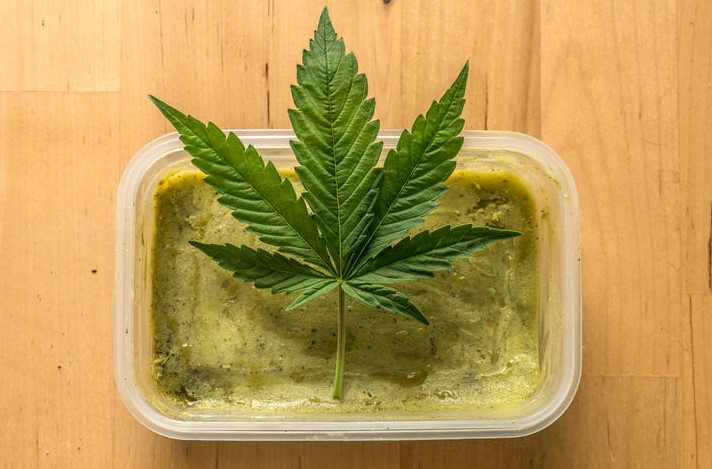-
×
 Full Spectrum CBD 1500mg
1 × $60.00
Full Spectrum CBD 1500mg
1 × $60.00 -
×
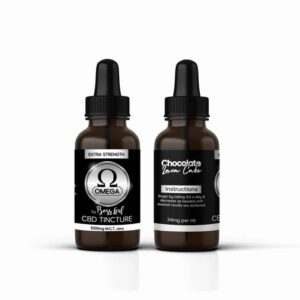 Omega CBD Chocolate Truffle 3000mg
1 × $75.00
Omega CBD Chocolate Truffle 3000mg
1 × $75.00 -
×
 CHILL 1000mg CBD Oil
3 × $20.00
CHILL 1000mg CBD Oil
3 × $20.00 -
×
 NFT
2 × $0.01
NFT
2 × $0.01
Blog
How To Make Cannabis Butter
The first step is to decarboxylate the cannabis. Place the cannabis on a baking tray and bake at 240 degrees Fahrenheit for 45 minutes, turning it after each period. The marijuana should now be brittle, dry, and ready to use. Next, combine butter and water in a pot on the stove and simmer until melted. After that, add cannabis to the mixture. Once the rice and liquid have been combined, leave it on low heat for up to three hours before stirring. Remove the mixture from the heat and allow it to cool before straining and pouring it into a bowl. Place it in the fridge to set. Finally, store it in an airtight container in the fridge.
Cannabutter is a food paste made by infusing butter with cannabis, which is an important component in the production of tasty hash candies. It’s just one of the many ways to consume marijuana through food. Cannaburgers, cannabis pasta, cannabis cake pops, ganja nachos, and other dishes are on the menu. High Times even released its own cookbook full of recipes that include marijuana use.
This article will not provide you with a long list of recipes, but it will teach you how to produce cannabutter, cannabis cooking oil, and cannabis-infused coconut oil. We also have suggestions on storage and a dosage primer for you. Sit back and learn how to make wonderful cannabutter; then think about all the fantastic things you’ll be able to do with it.
How to Make Cannabutter
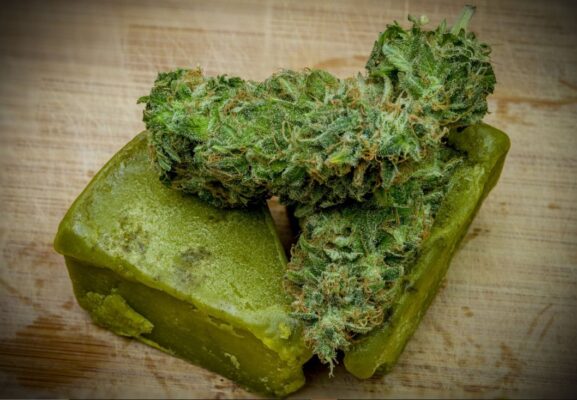 Edibles are increasingly popular among marijuana users, and many believe they’re the most efficient method to take in the drug. When you understand how to produce cannabutter, you have everything you need to cook up a slew of exotic and delicious dishes.
Edibles are increasingly popular among marijuana users, and many believe they’re the most efficient method to take in the drug. When you understand how to produce cannabutter, you have everything you need to cook up a slew of exotic and delicious dishes.
For some individuals, smoking marijuana is too harsh on their lungs. Edibles are simple to produce or obtain and provide a wonderful taste. The cannabis butter’s strength is determined by the marijuana strain you choose and the amount included. Another advantage of making cannabutter is that you have control over the potency level.
When the THC in the edible is absorbed, you should feel a more soothing and calming high than when you smoke. Edibles are not an ideal solution for fast response times. This is due to the fact that it can take anything from 1 to 7 hours for the substance to take effect, depending on dose, among other factors. The sensation, however, will almost certainly appear to be much more powerful!
When creating cannabis butter, oil, or coconut oil infused with marijuana, prospective cooks must realize the significance of decarboxylation. Also known as ‘decarbing,’ this is the act of unlocking the entire potency of your cannabis. You’ll wind up eating uncooked cannabis if you don’t do it correctly.
The most efficient method to decarb cannabis is by means of heating. By removing the COOH group from the former’s molecule as it releases water and carbon dioxide, this technique transforms THCA into THC. Place your marijuana in an oven that has been preheated to at least 240°F for between 45 and 60 minutes. After your weed is decarboxylated, you’re ready to make cannabutter.
How to Make Cannabis-Infused Butter (“Cannabutter”)
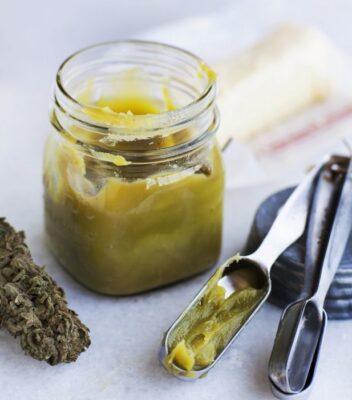 There are several cannabutter recipes accessible on the internet. All of them may be used to make an excellent ingredient for your edibles or other cannabis dishes. Because the list of components is short, most individuals are surprised by how simple it is to create cannabutter.
There are several cannabutter recipes accessible on the internet. All of them may be used to make an excellent ingredient for your edibles or other cannabis dishes. Because the list of components is short, most individuals are surprised by how simple it is to create cannabutter.
If you want to obtain the best butter, you’ll need to spend a significant amount of money on high-quality marijuana. The decarb procedure is likely to lose some THC, so keep that in mind while assessing the potency of your cannabutter.
Cannabutter Dosage
It’s really simple to make cannabutter; determining the correct dose is the difficult part. Even if you use the same amount each time, potency might vary from batch to batch. The quantity of heat used, as well as individual tolerance, and, of course, the marijuana strains utilized are all variables that influence your cannabis butter.
Calculating THC Content
The THC content of your strain is the most difficult thing to determine while making cannabutter. The potency levels vary from 3% in schwag to 30% in the most recent crops cultivated in places like Colorado. THC ranges anywhere from 12% to 21% for Trainwreck, for example.
Let’s pretend it’s a medium-strength Trainwreck with a THC concentration of 15 percent. The next step is to do some basic arithmetic.
- 1 gram = 1,000 milligrams
- 15% of 1,000 is 150 milligrams
In this case, one gram of Trainwreck marijuana contains 150mg of THC. If you use an ounce (28 grams), you’ll have 4,200mg of THC in your cannabutter (28 x 150).
So, for example, if you use the whole cup of butter to produce a batch of 40 brownies, each brownie should have 105 milligrams of THC (4200 / 40 = 105). It is acceptable to be off by a few milligrams when determining the THC potency of your cannabis.
Some, however not all, of the THC will be removed during decarboxylation. For the record, 105 mg of THC is a significant amount for most individuals.
Cannabutter Ingredients
Here’s what you’ll need to make cannabis-infused butter:
- 1 cup (approximately 8-11 grams) of decarboxylated ground cannabis. This amount can make 1 – 1.5 cups of butter. You can use up to an ounce if you wish, but take note of the potency
- 5 cups of salted butter
- 1 cup of water
- A container with a lid
- A glass or ceramic bowl that is heat and refrigerator safe
- A pot for ex. White Rain
- Spatula
- Cheesecloth
- Knife
- Twine
Method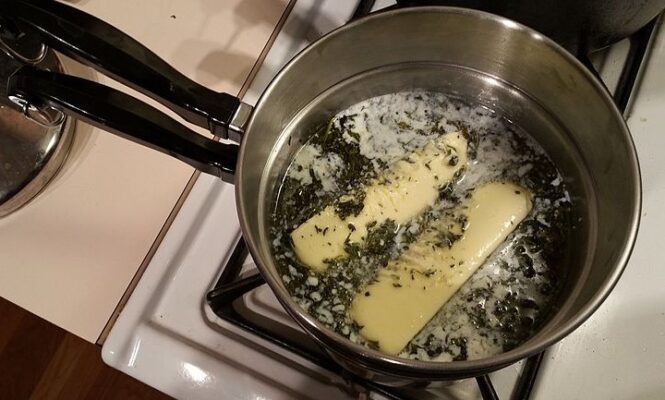
- Add the butter and water to the pot, set it on the stove at a low simmer, and let it cook for about 30 minutes. The water prevents the butter from burning. When the butter has melted, add the marijuana.
- For up to three hours, keep the mixture on a low heat and stir occasionally. You must avoid boiling the mixture. Allow it to cool after removing it from the heat.
- Cover your bowl with cheesecloth and tie it with twine to make a lid. Fill the dish halfway with the solution. The cloth will filter out any plant material, allowing you to drink more of the juice without getting sick. A coffee filter or mesh might be used as an alternate strainer.
- Remove the cheesecloth and cover your creation with it in the refrigerator to solidify. You’ll notice that the butter separates from the water. Remove it using a spatula by lifting it off with the knife. Place it in an airtight container after draining the rest of the water. Take out your cannabutter, add some cannabis flower, and make yourself a dream come true!
Cannabis to Butter Ratios
Choose a strain rich in THC if you want to unwind after a long day. If you want to utilize cannabis recipes for medicinal purposes, the best option is a higher CBD strain.
Once you’ve determined your ideal dosage, break the cannabutter into the right amounts. When eating cannabis-infused foods, go with the ‘go low and slow’ motto. This implies taking a tiny amount of marijuana and waiting at least two hours before consuming another dose. Edibles have a long onset time and build up in your system, eventually resulting to intoxication.
Putting Cannabis Butter in a Slow Cooker
If you have a slow cooker, it may be used to make cannabutter. Creating cannabutter takes far longer than the recipe above. However, it offers greater consistency in the end product. You don’t have to be concerned about having one part of the butter with a higher THC concentration than other parts because
Here’s what you’ll need for a simple slow cooker cannabutter recipe:
- A pound of butter
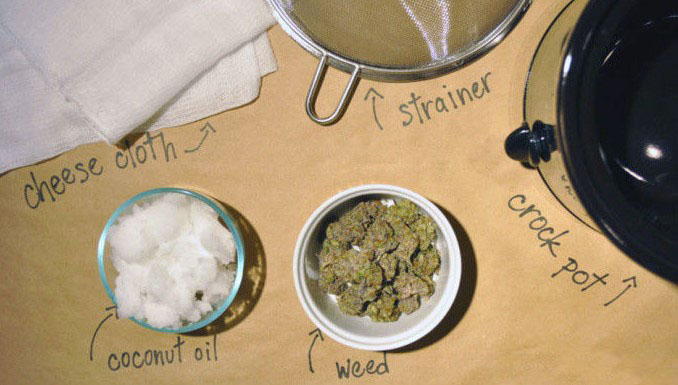
- A cup of water
- Up to an ounce of marijuana flower is allowed; the quantity varies depending on how strong you want the butter.
- A storage container
- A cheesecloth or metal strainer
- A slow cooker
Now, here’s how to make it:
- Switch on the slow cooker and place it on the lowest setting.
- Add the ingredients and stir.
- Cover and let the mixture cook for up to 18 hours. It will take longer to cook if you want a higher potency.
- When the cooking time is up, pour your cannabutter into a new bowl through a cheesecloth/metal strainer.
- Remove the butter from the fridge, wrap it in a clean cloth, and put it back in its original container. It will solidify and separate from the water as it cools.
- Remove the cannabutter from the water and place it in an airtight container.
- You may also make sous vide cannabutter. However, an immersion circulator is required. If you do, set your temperature to 185 degrees Fahrenheit and submerge it in a water bath. For around four hours, or eight hours if it hasn’t been decarboxylated yet, cook your mixture with already decarboxylized cannabis.
How Long to Cook Cannabis butterannabis Butter in a Crock-Pot?
A lot of people think that a Crock-Pot and a slow cooker are the same thing. However, there are some important distinctions. A Crock-Pot is a brand name for a stoneware pot with an incorporated heating element. In contrast, a slow cooker is generally a metal pot placed on top of a heated surface. A ‘slow cook’ isn’t really the same as any other type of appliance; rather, it’s just another term for what we know as ” crockpot.”
In any case, a Crock-Pot may be used to cook cannabutter, which has just two settings: low and high. There are more complicated versions available with digital timers, but you don’t have to have one.
In a Crock-Pot, cannabutter takes the same amount of time to cook as sous vide cannabutter. This means four hours with decarbed cannabis and twice the duration when you don’t decarburize marijuana.
What Is the Best Way to Make Cannabutter?
There’s no one-size-fits-all method to make cannabutter, according to some. We would disagree, however, and believe that our step-by-step tutorials are among the greatest you’ll find anywhere. A Crock-Pot, slow cooker, or saucepan may all be used.
However, there is also a single-pot method that doesn’t need a strainer. Instead of water, add unsalted butter and cannabis buds to a saucepan. Follow these steps:
- Fill the pot at least halfway up with water and bring it to a boil.
- Add the cannabis and butter, and put the lid on the pot.
- Keep the water boiling for around 90 minutes, but ensure it never boils over.
- Next, turn off the heat and allow the mixture to cool.
- Place it in the fridge for several hours to harden.
- You’ll notice butter floating on top of the pot, making it easy to remove using a spatula.
- The majority of the plant material will now be at the bottom, although some fragments may remain in the butter.
- Divide the butter into several portions and store accordingly!
Another alternative is to use coconut butter or oil instead of regular butter. You’ll get a delectable coconut-flavored creation with this.
Dosage of Homemade Cannabis Edibles
It’s vital to proceed with caution when producing cannabutter since the strength of the final product may be considerably greater than you realize. Your home-baked brownies are considerably stronger than a joint. However, because it takes longer to work, you might inadvertently eat a third or fourth slice. Within a few hours, you may become trapped on the sofa. The fact that cannabutter recipes are so potent is due in part to the fact that your cannabis is converted into an incredibly concentrated state during production.
Cannabis butter is so potent since it takes its name from the cooking process, which transforms cannabis into a highly concentrated form.
It’s also true that the edible variety makes a significant impact. The muffin you made from cannabis butter is most certainly going to have an impact on you differently than the gummies you buy online. Please keep in mind that your smoking tolerance and edibles tolerance are two separate things. If you’re used to smoking 30mg of THC, don’t make a cannabutter mix with 30mg of THC per serving unless instructed otherwise.
Calculations of Dosage May Be Wrong! Use Minimum Dosage
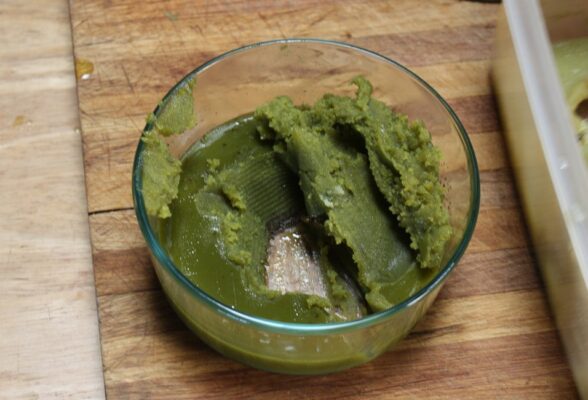 When you create marijuana butter and use it in a recipe, the amount you need to use for brownies, cakes, etc. is uncertain. There are so many factors to consider that producing a 100% correct dosage is nearly impossible. Even cannabis edibles and cannabutter makers struggle with this issue. They usually test their marijuana at different stages as part of their testing procedures.
When you create marijuana butter and use it in a recipe, the amount you need to use for brownies, cakes, etc. is uncertain. There are so many factors to consider that producing a 100% correct dosage is nearly impossible. Even cannabis edibles and cannabutter makers struggle with this issue. They usually test their marijuana at different stages as part of their testing procedures.
The first test is on the cannabis flowers used in the production run. This enables them to precisely determine how many terpenes and cannabinoids are available to be extracted.
The second test follows extraction to see how well the process worked. Finally, they rerun to confirm the amount of terpenes and cannabinoids remaining in the extract. When you make marijuana butter at home, you won’t have any of these equipment available.
THC converts to THC at a rate of 1: 0.88, meaning that the THCA in cannabis is typically transformed into THC after just one hour. That translates to a loss of 12% of the potential THC right away. It’s also worth noting that THC butter and oil extraction are rather ineffective. Here are some quick dosing instructions:
- Check the directions on your cannabis concentrate product to see if they include information on THCA or THC. If it’s the former, multiply by 0.88 to estimate the possible THC level.
- When preparing your cannabis butter recipe, portion it vertically instead of horizontally. Because cannabinoids have varying molecular weights, they settle in various layers. Do not scoop your cannabutter straight off the top since the butter at the top is quite different from that at the bottom.
- Make sure to measure and cut everything accurately.
- Always assume that the maximum amount of THC made it into each batch.
Calculating THC Dosage
It’s not as simple as converting grams to milligrams when it comes to calculating the correct dose. Let’s assume you have 50 grams of high-quality Bubba Kush with a THCA content of 20 percent. The overall THCA content is 200 mg per gram. There are 10,000mg of THCA in your purchase. When you convert THCA into THC, you divide by 0.88, so (10000 x 0.88) = 8,800mg of THC in total
You can expect a maximum extraction efficiency of 60% if you utilize a cannabutter recipe that contains ordinary dairy butter. To put it another way, just 5,280mg of THC is extracted (8,800 x 0.6).
If you want 100 milligrams of THC per brownie, you’ll need to bake roughly 52-53 brownies in total. Please keep in mind that each brownie is capable of containing up to 100mg of THC. It might be a lot more or a little more depending on various circumstances.
Possible Cannabutter Side Effects
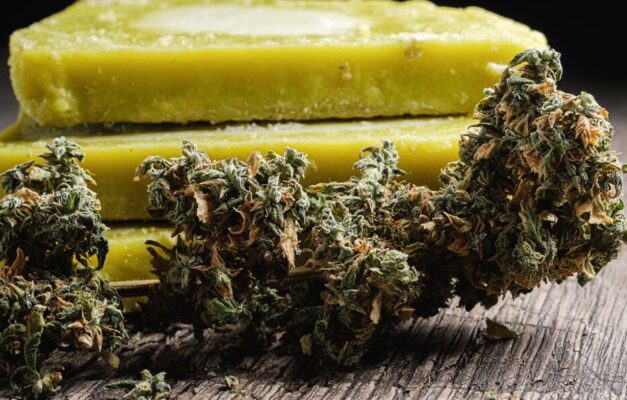
Whether you’re worried about bad effects like paranoia, etc., there are plenty of CBD-rich strains to choose from. Cannabidiol appears to counteract the negative affects of THC while still providing the same clinical usefulness.
The ideal ratio of THC to CBD for a non-intoxicating cannabis strain is 1:1, whereas anything higher than that can cause intoxication. You are virtually certain to become intoxicated if you take a large dose of THC after going past the 1:4 THC – CBD ratio.
If you take an edible and don’t experience any effects after an hour, eat something to stimulate your digestive system’s absorption. You may require two or even three doses in a day before noticing anything.
Tolerate for eight hours at a time before determining its effectiveness. Stay hydrated and consume the edible in a calm, secure setting. If you start with the lowest conceivable dosage and gradually increase, everything should go smoothly!
How to Store Cannabis-Infused Products
When it comes to edibles, their perishability is determined by the components used in their manufacture. Cakes, bread, and brownies expire faster than chocolate or gummies baked goods. Weed brownies, on the other hand, can go bad. Edibles may be frozen without degrading for several months when frozen correctly.
Cannabinoids are all susceptible to degradation under the influence of oxygen, heat, and light. As a result, your main focus should be on keeping your cannabis-infused sweets in a cool, dark, and sealed environment. If you’re unsure, keep your cannabis-infused chocolate in the fridge in a sealed container.
Treat edibles like real food as a general rule of thumb. Even after being kept in the refrigerator, your edibles will go bad if they contain dairy, just as non-cannabis products would.
Cookies and brownies endure for longer but harden to the point that you could use them as weapons! Lollipops, on the other hand, are already full of sugar. As a consequence, you can store them indefinitely in good condition if they’re properly stored.
For months, the THC in your edibles should not degrade significantly. That is, as long as you follow our recommendations for proper storage and if necessary, freeze them. They won’t taste quite as nice as they did when they were fresh, but you will still get some value from them.
Long-Term Storage of Cannabis-Infused Products
When storing cannabis-infused products in the refrigerator, you can increase their shelf life. When you intend on keeping edibles for more than a week or two, the freezer is the greatest location for edibles. Not all edibles are suitable for freezing, but brownies, cannabis oil, and cannabutter are exceptions.
Infused cooking oils will last longer if they’re kept in the fridge. Pair them with herbs and freeze them in ice cube trays to extend their shelf life. This is also beneficial for marijuana butter.
If you decide to freeze baked goods, keep them in ultracold storage for no more than two weeks. However, it’s a wonderful choice that beats having to trash your beloved pecan chocolate hash brownies.
Final Thoughts on How to Make Cannabutter
We’ve tried to make this information as comprehensive as possible, and we hope it helped you discover everything there is to know about making cannabutter. The procedure is far more straightforward than you might believe, allowing you to be innovative with your cannabis use.
Keep in mind, though, that edibles take longer to act than cannabis smoking or vaping. Their total effect is also stronger, so begin cautiously and wait patiently for the high to hit.


